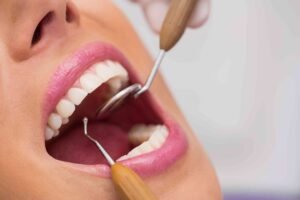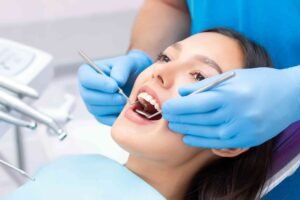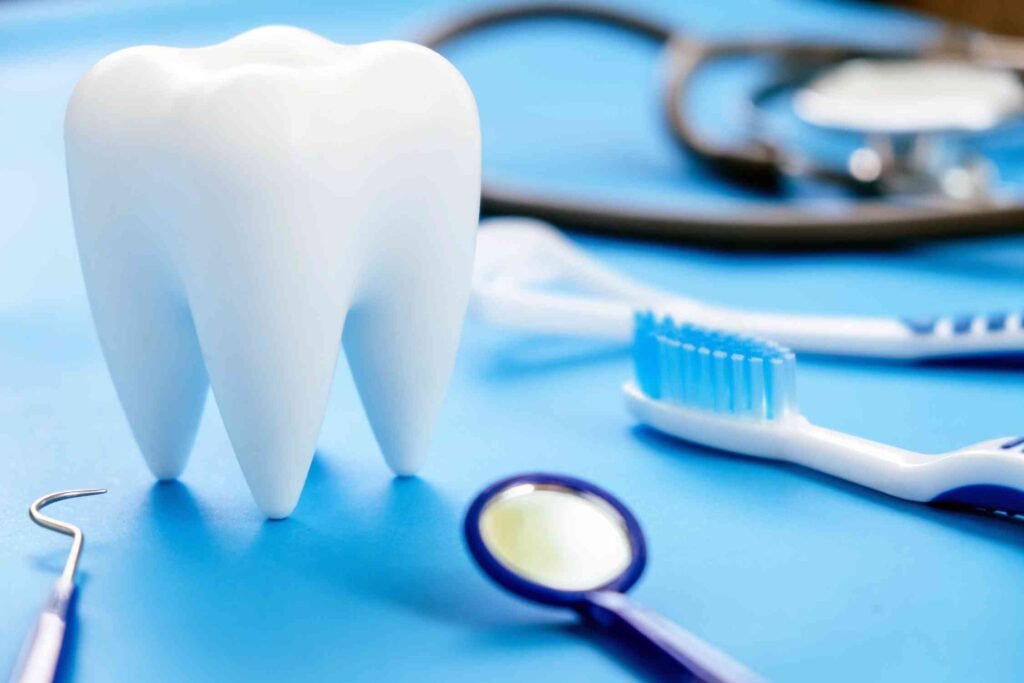How Dental Health Is Linked to Reproductive Health?
When we think about taking care of our teeth, most of us probably picture fresh breath, bright smiles, and avoiding painful cavities. But what if we told you that your dental health might actually have a say in something as personal and complex as your reproductive health? Sounds surprising, right?
It turns out that your mouth is more than just the starting point of your digestive system—it’s also a reflection of your overall health. And in recent years, scientists and health experts have been digging into a lesser-known but super important connection: how dental health is linked to reproductive health.
Let’s explore this fascinating relationship and break down what it could mean for you or someone you care about.
How Dental Health Is Linked to Reproductive Health?
At first glance, your gums and your reproductive organs seem to live in totally different worlds. One’s in your mouth, the other’s… well, you know. But here’s the thing: our body works as a highly connected system, and inflammation or infection in one part can trigger reactions elsewhere.
The link between the mouth and reproductive system mainly stems from the immune system and how the body responds to bacteria and inflammation. When you have gum disease—also known as periodontitis—it doesn’t just stay in your mouth. The bacteria and the inflammatory signals can travel through your bloodstream and cause problems in distant organs, including those involved in reproduction.
Now, let’s break it down further and look at how this connection plays out for both men and women.

Women’s Health: How Dental Health Can Influence Fertility and Pregnancy
When we talk about how dental health is linked to reproductive health in women, the conversation usually starts with fertility and pregnancy outcomes. There’s quite a bit of research suggesting that oral health issues may make it harder to conceive and can even lead to complications during pregnancy.
1. Fertility Struggles and Gum Disease
Trying to conceive can be an emotional rollercoaster, and sometimes, issues with fertility can come from the most unexpected places—like your gums. Studies have shown that women with untreated periodontal disease may take longer to get pregnant compared to those with healthy gums.
One large study from Australia found that women with gum disease took about two months longer to conceive. That’s a pretty eye-opening statistic, especially when you consider that many of these women had no idea their oral health was playing a role.
2. Pregnancy Complications
Pregnancy itself is a delicate time, and the body goes through a lot of changes—hormonal, physical, emotional, you name it. One of those changes includes increased blood flow and inflammation, which can actually make gum problems worse.
In fact, pregnant women are more prone to something called “pregnancy gingivitis,” which can lead to swollen, bleeding gums. But it doesn’t stop there. If that inflammation becomes more severe, it may increase the risk of preterm birth, low birth weight, or even preeclampsia.
Some experts believe that oral bacteria might enter the bloodstream and travel to the uterus, triggering premature labor. That’s why many OB-GYNs now recommend that women get a dental check-up as part of their preconception and prenatal care.
Men’s Reproductive Health and Oral Health
Okay, fellas—don’t scroll away just yet. The idea that dental health is linked to reproductive health isn’t just for women. Men are also affected, especially when it comes to fertility.
1. Gum Disease and Sperm Quality
There’s growing evidence suggesting that periodontal disease can negatively affect sperm quality and count. Inflammation caused by gum infections may have a systemic impact on the body, including oxidative stress, which is bad news for sperm health.
Some studies even point to a correlation between gum disease and lower testosterone levels. While the research is still evolving, it’s becoming clear that maintaining oral health may be just as important as taking vitamins and eating healthy when you’re trying to conceive.

2. Erectile Dysfunction
This one might sound a little out there, but stay with us. Erectile dysfunction (ED) and gum disease may have more in common than you’d think. Chronic inflammation and poor circulation are issues at the core of both conditions.
When your gums are constantly inflamed, your blood vessels can become damaged—yes, even the ones involved in sexual function. Several studies have found that men with severe periodontal disease were more likely to experience ED than those with healthy gums. Again, the keyword here is inflammation. It’s a troublemaker.
The Role of Inflammation: The Hidden Connector
So, how exactly does all of this happen? How is it possible that a problem in your mouth can impact your reproductive system?
Let’s get a little science-y for a moment. When you have gum disease, your mouth becomes a battleground of bacteria and inflammation. These bacteria release toxins, and in response, your immune system kicks in. This produces inflammatory markers like C-reactive protein (CRP), which can spread throughout the body via your bloodstream.
And here’s where it gets really interesting: chronic inflammation is known to interfere with several reproductive processes. It can mess with ovulation, sperm production, embryo implantation, and even placental development.
So essentially, the inflammation from your gums could be creating a hostile environment for conception and healthy pregnancy, without you even knowing it.
Hormonal Changes and Oral Health:
While we’re on the topic of how dental health is linked to reproductive health, we also have to talk about how hormones affect your mouth. That’s right—the relationship goes both ways.
Women go through several hormonal changes throughout their lives—puberty, menstruation, pregnancy, and menopause. Each of these phases can make the gums more sensitive to plaque and bacteria. This can lead to bleeding, swelling, and in some cases, full-blown periodontitis.

Men, on the other hand, may experience oral changes linked to testosterone levels. Low testosterone has been associated with bone loss in the jaw, which can weaken the support system for your teeth. Hormones and oral health are deeply intertwined, and when one is off, the other can follow.
PCOS, Endometriosis, and Gum Disease: The Overlapping Syndromes
Women dealing with reproductive health conditions like PCOS (Polycystic Ovary Syndrome) or endometriosis might want to pay special attention here.
PCOS is often accompanied by insulin resistance and chronic inflammation—both of which can worsen gum disease. Likewise, women with endometriosis often report higher levels of systemic inflammation, which can contribute to oral health problems.
There’s also emerging research suggesting that women with PCOS are more likely to have gingivitis and periodontitis compared to women without the condition. While more research is needed, it further illustrates how dental health is linked to reproductive health in more ways than one.
Steps to Protect Your Oral and Reproductive Health
So now that we’ve explored the connection, what can you actually do about it? Luckily, protecting your dental health is relatively straightforward, and doing so could have a ripple effect on your overall and reproductive wellness.
Here’s a simple checklist:
1. Schedule Regular Dental Visits
Aim for a dental check-up every 6 months, and don’t skip cleanings. If you’re pregnant or planning to be, let your dentist know—there are special considerations for pregnant women.
2. Brush and Floss Daily
Yes, it sounds basic, but consistency is key. Brushing twice a day and flossing once a day helps prevent plaque buildup, which is the starting point for gum disease.

3. Eat a Balanced Diet
A diet rich in antioxidants, vitamins (especially vitamin C and D), and low in processed sugars supports both your oral and reproductive health. What you eat really does matter.
4. Don’t Ignore Bleeding Gums
If your gums bleed when you brush or floss, that’s a sign of inflammation. Don’t brush it off (pun intended). Talk to your dentist.
5. Get a Preconception Health Check
If you’re trying to conceive, include dental health in your pre-pregnancy checklist. It could make a bigger difference than you think.

A Quick Word on Birth Control and Oral Health
This is something many people don’t know: certain birth control methods can affect your gums. For example, hormonal contraceptives that contain estrogen and progesterone may increase the risk of gum inflammation.
If you’re using birth control and start to notice changes in your oral health—like more sensitivity or bleeding—it’s worth bringing it up with both your dentist and doctor. It’s all connected, after all.
Conclusion:
The idea that your mouth can influence your ability to conceive or carry a pregnancy might sound like a stretch at first—but the science is catching up, and it’s all pointing in the same direction.
The inflammation and bacteria involved in gum disease don’t just stay put. They travel, they trigger immune responses, and they may be silently affecting other systems—including the reproductive one.
So, the next time you pick up your toothbrush, just remember: you’re not just caring for your smile. You’re supporting your whole body—maybe even your future family.


